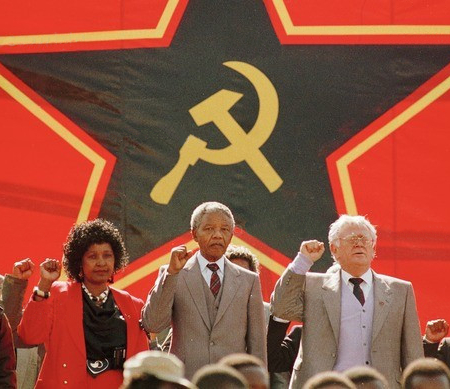
As the world mourns the loss of Nelson Mandela, the hero who spearheaded the fight to end institutionalized racism in South Africa, secularists will be well advised to remember a rather obscure angle of his life: that while Mandela was fighting for racial equality, South African whites weren’t all so keen on letting go of their privileged position, and hence aside from those who actively tried to shore up the apartheid, most stayed out of the matter. Only a very small group of white South Africans entered an alliance with Mandela and fought alongside him to end the apartheid. And who were those?
The CPSA [Communist Part of South Africa] was declared illegal in 1950. The party went underground and, in 1953 relaunched itself as the South African Communist Party – the name change emphasising the party’s orientation towards the particular concerns of South Africans. The party was not legalised until 1990.
The CPSA/SACP was a particular target of the National Party government elected in 1948. The Suppression of Communism Act was used against all those dedicated to ending apartheid, but was obviously particularly targeted at the SACP.
Following the repression of the CPSA, the party adopted a policy of primarily working within the ANC [Mandela’s African National Congress] in order to reorient that organisation’s programme from a nationalist policy akin to the CPSA’s former Native Republic policy towards a non-racial programme which declared that all ethnic groups residing in South Africa had equal rights to the country. While black members of the SACP were encouraged to join the ANC and seek leadership positions within that organization, many of its white leading members formed the Congress of Democrats which in turn allied itself with the African National Congress and other ‘non-racial’ congresses in the Congress Alliance. The Congress Alliance committed itself to a democratic non-racial South Africa where the ‘people shall govern’ through the Freedom Charter. The Freedom Charter, having been developed by leading members of the Congress of Democrats, was adopted by the ANC leadership and has since remained the cornerstone of the ANC’s programme throughout the years of repression.
In exile the influence of the SACP grew as communist states provided the ANC with funds and arms. Patient work by the ANC slowly rebuilt the organisation inside South Africa and it was the ANC, with communists in prominent positions, who were able to capitalize on the wave of anger that swept young South Africans during and after the Soweto Uprising of 1976.
Communist Joe Slovo… was perhaps the leading theoretician of the revolutionary struggle the ANC were engaged in. The ANC itself, though, remained broadly social democratic in outlook. [Emphasis added]
Eventually external pressures and internal ferment made even many strong supporters of apartheid recognise that change had to come and a long process of negotiations began which resulted, in 1994, in the defeat of the National Party by the ANC.
Yes, the theoritician of ANC’s struggle was a godless communist, Joe Slovo (picture above, with Mandela, after the latter’s release from prison). And Slovo is doubly hated by racists, for being Jewish, and for being an ally of Mandela.
And calling Slovo is godless communist (to fully imitate McCarthyist rhetoric) is fully justified, as it happens.
Although his family were religious, he became an atheist who retained respect for “the positive aspects of Jewish culture”.
Slovo joined the South African Communist Party in 1942. Inspired by the Red Army’s battles against the Nazis on the Eastern Front of World War II, Slovo volunteered to fight in the war, afterwards joining the Springbok Legion, a multiracial radical ex-servicemen’s organization, upon his return.
Now, the point here is not to praise communism. And actions of Slovo, no matter how wonderful, by no means provide expiation for communist atrocities committed by the KGB, Mao’s Red Guards, or the Stasi. On the other hand-when religious apologists (all too often) blame the said atrocities on atheism, it is helpful to gently bring the communists’ part in bringing democracy to South Africa also to their attention.
